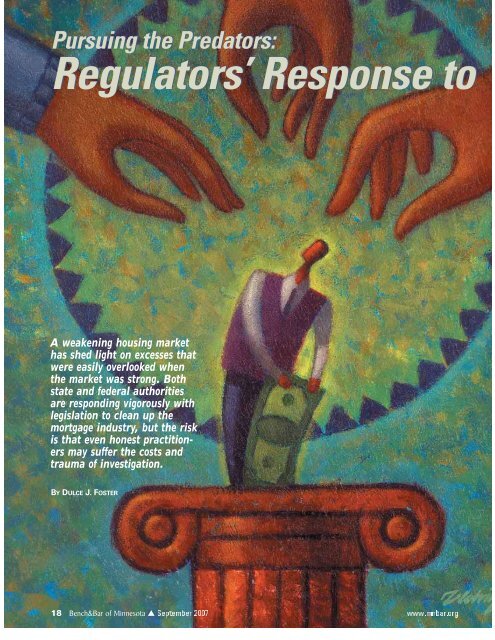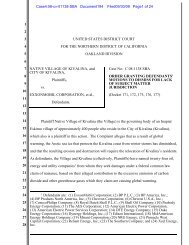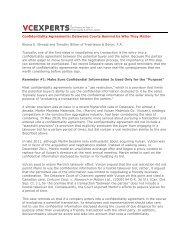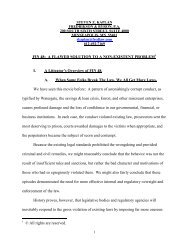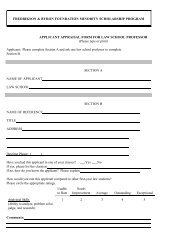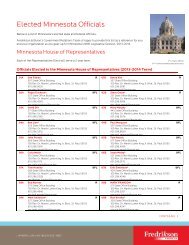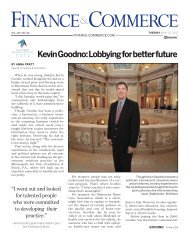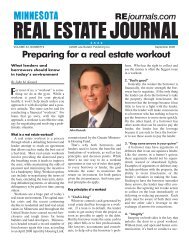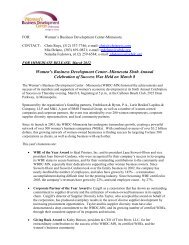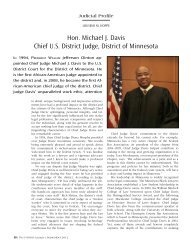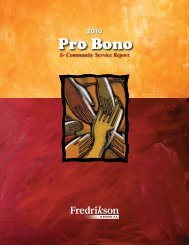Pursuing the Predators: Regulators Response to Mortgage Fraud
Pursuing the Predators: Regulators Response to Mortgage Fraud
Pursuing the Predators: Regulators Response to Mortgage Fraud
You also want an ePaper? Increase the reach of your titles
YUMPU automatically turns print PDFs into web optimized ePapers that Google loves.
<strong>Pursuing</strong> <strong>the</strong> <strong>Preda<strong>to</strong>rs</strong>:<br />
<strong>Regula<strong>to</strong>rs</strong>’ <strong>Response</strong> <strong>to</strong><br />
A weakening housing market<br />
has shed light on excesses that<br />
were easily overlooked when<br />
<strong>the</strong> market was strong. Both<br />
state and federal authorities<br />
are responding vigorously with<br />
legislation <strong>to</strong> clean up <strong>the</strong><br />
mortgage industry, but <strong>the</strong> risk<br />
is that even honest practitioners<br />
may suffer <strong>the</strong> costs and<br />
trauma of investigation.<br />
BY DULCE J. FOSTER<br />
18 Bench&Bar of Minnesota ▲ September 2007 www.mnbar.org
<strong>Mortgage</strong> <strong>Fraud</strong><br />
Illustration by Imagezoo © Images.com<br />
For many people, becoming a homeowner<br />
is what <strong>the</strong> great American<br />
dream is all about. Like <strong>the</strong> three<br />
little pigs in <strong>the</strong> fairy tale, we grow<br />
up, leave our families and venture out<br />
in<strong>to</strong> <strong>the</strong> world, aspiring <strong>to</strong> obtain a beautiful<br />
home where we can raise our children.<br />
During <strong>the</strong> first half of <strong>the</strong> decade<br />
that dream became approachable for<br />
many families as interest rates plummeted.<br />
Subprime lenders and mortgage brokers<br />
devised creative strategies <strong>to</strong> enable<br />
people with lower incomes and bad credit<br />
his<strong>to</strong>ries <strong>to</strong> obtain mortgages. As <strong>the</strong><br />
more recent slump in <strong>the</strong> housing market<br />
reflects, however, many of those creative<br />
(and risky) strategies have failed and contributed<br />
<strong>to</strong> a sharp spike in foreclosure<br />
rates nationwide. A growing number of<br />
consumers are discovering <strong>the</strong>y might<br />
lose <strong>the</strong>ir homes, unable <strong>to</strong> sustain <strong>the</strong>ir<br />
obligations as interest and property tax<br />
rates increase and introduc<strong>to</strong>ry teaser<br />
rates on adjustable-rate mortgages vanish.<br />
According <strong>to</strong> RealtyTrac, Inc., foreclosure<br />
rates nationally rose 27 percent in<br />
<strong>the</strong> first quarter of 2007 over <strong>the</strong> previous<br />
quarter and were up 35 percent from <strong>the</strong><br />
same period in 2006. Foreclosure rate<br />
increases in Minnesota were even more<br />
startling, reflecting a 35 percent increase<br />
over <strong>the</strong> previous quarter and as much as<br />
a 130 percent increase over <strong>the</strong> first quarter<br />
of 2006. The spike in foreclosures and<br />
a related downturn in <strong>the</strong> housing market<br />
have sent ripple effects throughout<br />
<strong>the</strong> national economy, causing regula<strong>to</strong>rs<br />
and consumer advocacy groups <strong>to</strong> stand<br />
up and take notice. Everyone is pointing<br />
a finger at someone and asking, “Who is<br />
<strong>to</strong> blame?”<br />
No Single Villain<br />
In actuality <strong>the</strong>re is no single “big bad<br />
wolf” who is responsible for <strong>the</strong> crisis in<br />
<strong>the</strong> housing market, but ra<strong>the</strong>r, many<br />
players are involved. The one thing that<br />
regula<strong>to</strong>rs all appear <strong>to</strong> agree upon, however,<br />
is that fixing <strong>the</strong> problem demands<br />
clamping down on preda<strong>to</strong>ry lending<br />
practices and ramping up enforcement<br />
actions against mortgage fraud.<br />
<strong>Mortgage</strong> fraud can take many different<br />
forms, and may be perpetrated by a<br />
variety of players. <strong>Mortgage</strong> fraud investi-<br />
gations frequently target mortgage brokers,<br />
who process mortgage applications,<br />
act as intermediaries between buyers and<br />
lenders, and are at <strong>the</strong> center of many<br />
transactions. Because <strong>the</strong>y are typically<br />
paid commissions for <strong>the</strong>ir services based<br />
on loan amounts, mortgage brokers are<br />
strongly motivated <strong>to</strong> obtain lenders’<br />
approval for buyers’ applications. Brokers<br />
who become overzealous in seeking such<br />
approval may find <strong>the</strong>mselves on <strong>the</strong><br />
wrong side of a civil or even criminal<br />
fraud investigation. A typical example is<br />
<strong>the</strong> broker who is alleged <strong>to</strong> have intentionally<br />
overstated <strong>the</strong> buyer’s income or<br />
assets on an application in order <strong>to</strong> dupe<br />
<strong>the</strong> lender in<strong>to</strong> approving it.<br />
This kind of approval became easier <strong>to</strong><br />
obtain with <strong>the</strong> advent of “no-documentation”<br />
or “stated-income” loan transactions.<br />
In <strong>the</strong>se transactions, a borrower<br />
pays a higher interest rate and <strong>the</strong> lender,<br />
in exchange, relies on <strong>the</strong> income representations<br />
made on <strong>the</strong> application without<br />
demanding supporting documentation<br />
or making substantial efforts <strong>to</strong> verify<br />
those representations. Minnesota<br />
At<strong>to</strong>rney General Lori Swanson argued<br />
for regulations against stated-income<br />
loans in testimony before <strong>the</strong> Board of<br />
Governors of <strong>the</strong> Federal Reserve System<br />
on June 14, 2007. According <strong>to</strong> At<strong>to</strong>rney<br />
General Swanson, <strong>the</strong> intended purpose<br />
of stated-income loans is <strong>to</strong> provide an<br />
avenue of approval for self-employed<br />
individuals and o<strong>the</strong>rs whose income is<br />
not derived from a regular paycheck subject<br />
<strong>to</strong> verification. Instead, she says, <strong>the</strong>y<br />
have become an avenue for unscrupulous<br />
brokers who have falsified applications<br />
“<strong>to</strong> claim that oc<strong>to</strong>genarians hauled in<br />
cash by making bird houses <strong>the</strong>y didn’t<br />
make or cleaning houses <strong>the</strong>y didn’t<br />
clean, that a gardener in his early 20s<br />
made $6,000 per month as a ‘landscape<br />
engineer,’ or that a suburban couple<br />
earned money renting out a nonexistent<br />
apartment in <strong>the</strong>ir home.”<br />
A mortgage broker who intentionally<br />
inflates a buyer’s income may feel morally<br />
justified in doing so, on <strong>the</strong> ground that<br />
he is helping <strong>the</strong> buyer obtain a home<br />
that o<strong>the</strong>rwise she would not be able <strong>to</strong><br />
afford. The broker may point out that<br />
many such transactions are successful:<br />
When <strong>the</strong> buyers are able <strong>to</strong> meet <strong>the</strong>ir<br />
obligations everyone wins, including <strong>the</strong><br />
lender. Such is not <strong>the</strong> case, however,<br />
when <strong>the</strong> buyer finds herself overextended<br />
and cannot make <strong>the</strong> required payments.<br />
Then <strong>the</strong> buyer loses <strong>the</strong> home<br />
and <strong>the</strong> lender typically sustains substantial<br />
losses when <strong>the</strong> outstanding balance<br />
is not recovered in <strong>the</strong> foreclosure sale.<br />
<strong>Fraud</strong> Takes Many Forms<br />
Although mortgage brokers are easy<br />
political targets for state and federal regula<strong>to</strong>rs<br />
attempting <strong>to</strong> assign blame, it<br />
should be acknowledged that <strong>the</strong> buyers<br />
<strong>the</strong>mselves are often at fault. Buyers may<br />
intentionally inflate <strong>the</strong>ir own incomes,<br />
with or without <strong>the</strong> brokers’ knowledge,<br />
and place <strong>the</strong>mselves in <strong>the</strong> precarious<br />
position of assuming obligations <strong>the</strong>y cannot<br />
afford. To view <strong>the</strong> problem solely as<br />
an issue of mortgage industry opportunists<br />
taking advantage of poor, unsophisticated<br />
consumers is <strong>to</strong> ignore <strong>the</strong> responsibility<br />
that some buyers share for making <strong>the</strong>ir<br />
own bad decisions. After all, <strong>the</strong> moral of<br />
<strong>the</strong> fairy tale is not simply that wolves are<br />
bad, but ra<strong>the</strong>r, that smart pigs will not<br />
build <strong>the</strong>ir houses out of straw.<br />
Buyers may become embroiled in<br />
mortgage fraud investigations in o<strong>the</strong>r<br />
ways, as well. Take, for example, <strong>the</strong> case<br />
of Isadore Stewart and Jill Lehn. In<br />
December 2006, Stewart, a real estate<br />
buyer, and Lehn, a closing agent, pleaded<br />
guilty in federal court in Minnesota <strong>to</strong><br />
criminal wire fraud charges arising from<br />
mortgage transactions. According <strong>to</strong><br />
court documents filed in <strong>the</strong> case, Lehn<br />
prepared closing documents related <strong>to</strong><br />
over 60 real estate transactions that deliberately<br />
overstated <strong>the</strong> true purchase price<br />
for <strong>the</strong> properties. Lehn allegedly concealed<br />
from lenders <strong>the</strong> fact that a portion<br />
of <strong>the</strong> loan proceeds would be redistributed<br />
<strong>to</strong> buyers, such as Stewart, and o<strong>the</strong>r<br />
parties. The government alleges that buyers<br />
obtained a <strong>to</strong>tal of over $3 million in<br />
concealed payments in <strong>the</strong>se transactions,<br />
and that Stewart personally derived<br />
over $271,000 from three separate real<br />
estate purchases. Nei<strong>the</strong>r Stewart nor<br />
Lehn has yet been sentenced, but both<br />
face maximum potential penalties of up<br />
<strong>to</strong> 20 years in prison and $250,000 fines.<br />
www.mnbar.org September 2007 ▲ Bench&Bar of Minnesota 19
As <strong>the</strong> case of Stewart and Lehn suggests,<br />
mortgage fraud investigations tend<br />
<strong>to</strong> focus not on individuals acting alone,<br />
but ra<strong>the</strong>r, on an alleged conspiracy of<br />
individuals, each of whom may play a different<br />
role in <strong>the</strong> transactions at issue.<br />
Such is <strong>the</strong> case in a typical “flipping”<br />
scheme. Flipping occurs when a real<br />
estate inves<strong>to</strong>r purchases a home and<br />
<strong>the</strong>n resells it within a short period of<br />
time for a higher price. Usually <strong>the</strong>re is<br />
nothing illegal about <strong>the</strong>se transactions<br />
and, when <strong>the</strong> buyer makes improvements<br />
<strong>to</strong> <strong>the</strong> home before reselling it, <strong>the</strong><br />
practice can be beneficial <strong>to</strong> a community<br />
by raising property values. Flipping<br />
becomes fraudulent, however, when <strong>the</strong><br />
inves<strong>to</strong>r colludes with a dishonest<br />
appraiser, who intentionally overstates<br />
<strong>the</strong> appraised value of <strong>the</strong> home so that<br />
<strong>the</strong> inves<strong>to</strong>r can resell it for a grossly<br />
inflated profit. A flipping scheme can<br />
take advantage of an unsuspecting buyer<br />
or, when <strong>the</strong> buyer himself is a participant<br />
in <strong>the</strong> conspiracy, leave <strong>the</strong> lender holding<br />
substantial losses when <strong>the</strong> buyer<br />
allows <strong>the</strong> home <strong>to</strong> go in<strong>to</strong> foreclosure<br />
and <strong>the</strong> lender is unable <strong>to</strong> recover <strong>the</strong><br />
outstanding balance of <strong>the</strong> loan.<br />
“Equity stripping” is ano<strong>the</strong>r practice<br />
that has raised concerns among regula<strong>to</strong>rs.<br />
Equity stripping typically targets homeowners<br />
who are experiencing financial distress,<br />
have fallen behind in <strong>the</strong>ir mortgage<br />
payments, and are facing a risk of foreclosure.<br />
Usually a homeowner attempts <strong>to</strong><br />
refinance and is turned down by <strong>the</strong><br />
lender. A foreclosure notice is published in<br />
<strong>the</strong> local newspaper and is read by a “foreclosure<br />
rescue” firm, which approaches <strong>the</strong><br />
troubled homeowner offering help. The<br />
foreclosure rescuer pays off <strong>the</strong> balance<br />
owed in foreclosure, acquires title <strong>to</strong> <strong>the</strong><br />
home, and agrees <strong>to</strong> reconvey <strong>the</strong> property<br />
<strong>to</strong> <strong>the</strong> homeowner under <strong>the</strong> terms of a<br />
lease or contract for deed. This kind of<br />
arrangement may be considered preda<strong>to</strong>ry<br />
if <strong>the</strong> terms of <strong>the</strong> lease or contract are<br />
unreasonably high, resulting in <strong>the</strong> homeowner’s<br />
inability <strong>to</strong> pay and ultimate eviction<br />
from <strong>the</strong> home, while <strong>the</strong> “rescue”<br />
firm retains ownership and <strong>the</strong> homeowner’s<br />
equity in it. It becomes fraudulent if <strong>the</strong><br />
firm knowingly misleads <strong>the</strong> homeowner<br />
about any of <strong>the</strong> terms of <strong>the</strong> arrangement.<br />
In June of this year, <strong>the</strong> Minnesota<br />
Office of <strong>the</strong> United States At<strong>to</strong>rney led a<br />
Concerns about mortgage fraud and<br />
preda<strong>to</strong>ry lending practices have led<br />
state and federal lawmakers <strong>to</strong> push<br />
for new legislation targeted at<br />
cleaning up <strong>the</strong> mortgage industry.<br />
grand jury <strong>to</strong> indict a former mortgage broker<br />
and his assistant in an alleged equitystripping<br />
scheme that went a step fur<strong>the</strong>r.<br />
According <strong>to</strong> <strong>the</strong> indictment, <strong>the</strong>y<br />
encouraged distressed homeowners <strong>to</strong> refinance<br />
and <strong>the</strong>n used physical intimidation<br />
<strong>to</strong> force <strong>the</strong> homeowners <strong>to</strong> endorse<br />
<strong>the</strong> equity checks produced in <strong>the</strong> refinancing<br />
process over <strong>to</strong> <strong>the</strong>mselves. The<br />
two now face charges carrying a maximum<br />
potential penalty of 20 years in prison.<br />
Such bold schemes are not uncommon.<br />
The United States At<strong>to</strong>rney’s<br />
Office also had <strong>the</strong> president of a title and<br />
escrow company indicted this past June.<br />
The indictment alleges that she opened<br />
an escrow account <strong>to</strong> deposit funds from<br />
lenders for real estate closings, but <strong>the</strong>n<br />
transferred <strong>the</strong> money <strong>to</strong> her own personal<br />
account and used it <strong>to</strong> pay about $2.5<br />
million in personal expenses.<br />
Not all problems in <strong>the</strong> housing market<br />
can be attributed <strong>to</strong> blatant misconduct.<br />
Commenta<strong>to</strong>rs are also raising concerns<br />
about lending practices that are not<br />
illegal, but never<strong>the</strong>less may be viewed as<br />
preda<strong>to</strong>ry. They point <strong>to</strong> insufficient disclosures<br />
<strong>to</strong> consumers, overly ambitious<br />
prepayment penalties, and exorbitant<br />
closing costs. Brokers are not <strong>the</strong> only<br />
parties implicated by <strong>the</strong>se concerns.<br />
Commenta<strong>to</strong>rs also point <strong>to</strong> lawyers who<br />
fail <strong>to</strong> properly advise <strong>the</strong>ir clients of <strong>the</strong><br />
risks associated with transactions, lenders<br />
who fail <strong>to</strong> apply sufficiently rigorous<br />
underwriting standards, and even secondary<br />
market inves<strong>to</strong>rs — who some argue<br />
should be liable <strong>to</strong> homebuyers for failing<br />
<strong>to</strong> conduct proper due diligence before<br />
taking assignment of questionable loans.<br />
Regula<strong>to</strong>ry <strong>Response</strong>: Minnesota<br />
Concerns about mortgage fraud and<br />
preda<strong>to</strong>ry lending practices have led state<br />
and federal lawmakers <strong>to</strong> push for new legislation<br />
targeted at cleaning up <strong>the</strong> mortgage<br />
industry. On May 14 of this year,<br />
Governor Tim Pawlenty signed a preda<strong>to</strong>ry<br />
lending practices law (S.F. No. 988) that<br />
— for <strong>the</strong> first time in Minnesota —<br />
specifically defines residential mortgage<br />
fraud as a criminal offense. Under <strong>the</strong><br />
terms of <strong>the</strong> new law, which went in<strong>to</strong><br />
effect on August 1, “residential mortgage<br />
fraud” is defined as knowingly making or<br />
using any misstatement, misrepresentation<br />
or omission that is both “deliberate” and<br />
“material” during <strong>the</strong> “mortgage lending<br />
process” with <strong>the</strong> intent that any party <strong>to</strong><br />
<strong>the</strong> mortgage lending process rely upon it.<br />
The “mortgage lending process” includes<br />
virtually every step in a mortgage transaction,<br />
including solicitation, application or<br />
origination, negotiation of terms, thirdparty<br />
provider services, underwriting, signing<br />
and closing, and funding of <strong>the</strong> loan.<br />
Documents involved in this process<br />
include required disclosures, loan applications,<br />
appraisal reports, HUD-1 settlement<br />
statements, and supporting personal documentation<br />
for income verification, such as<br />
W-2 forms, bank statements, tax returns<br />
and payroll stubs. Violating <strong>the</strong> law can<br />
lead <strong>to</strong> a felony conviction with a maximum<br />
term of imprisonment of two years,<br />
and manda<strong>to</strong>ry restitution <strong>to</strong> any identified<br />
victims. In addition <strong>to</strong> enacting new<br />
criminal penalties, <strong>the</strong> law also contains<br />
provisions prohibiting prepayment penalties<br />
for subprime loans and creates a private<br />
civil right of action for borrowers<br />
injured by violations of <strong>the</strong> affected<br />
statutes and o<strong>the</strong>r state mortgage laws.<br />
This new law joins ano<strong>the</strong>r new preda<strong>to</strong>ry<br />
lending practices law approved by<br />
Governor Pawlenty on April 20 (H.F. No.<br />
1004), which also became effective August<br />
20 Bench&Bar of Minnesota ▲ September 2007 www.mnbar.org
Even honest practitioners may find <strong>the</strong>mselves under investi-<br />
gation for alleged crimes in which <strong>the</strong>y were no more than<br />
1. Although <strong>the</strong> new law establishes no<br />
new criminal penalties, H.F. No. 1004<br />
included a number of provisions targeted at<br />
preda<strong>to</strong>ry lending practices, including: a<br />
prohibition against stated-income loans; a<br />
requirement that mortgage origina<strong>to</strong>rs verify<br />
borrowers’ ability <strong>to</strong> make scheduled<br />
payments; a prohibition against “churning”<br />
(arranging a refinance that provides no tangible<br />
benefit <strong>to</strong> <strong>the</strong> buyer); a requirement<br />
that origina<strong>to</strong>rs make disclosures <strong>to</strong> buyers<br />
about anticipated property taxes and hazard<br />
insurance costs; a prohibition against mortgage<br />
repayment options resulting in negative<br />
amortization; and a provision establishing<br />
fiduciary duties owed by mortgage<br />
brokers <strong>to</strong> borrowers as <strong>the</strong>ir agents.<br />
These new laws complement<br />
Minnesota’s equity-stripping statute,<br />
which was enacted in 2004 and codified<br />
at Minn. Stat. ch. 325N. That law imposes<br />
strict disclosure and o<strong>the</strong>r requirements<br />
on any inves<strong>to</strong>r who purchases a home in<br />
foreclosure and subsequently reconveys or<br />
promises <strong>to</strong> reconvey continuing rights <strong>to</strong><br />
<strong>the</strong> homeowner <strong>to</strong> possess <strong>the</strong> property.<br />
The equity-stripping statute creates criminal<br />
penalties against any such inves<strong>to</strong>r<br />
who defrauds a homeowner, including<br />
imprisonment of up <strong>to</strong> one year and fines<br />
of up <strong>to</strong> $50,000 (Minn. Stat. §325N.18).<br />
Regula<strong>to</strong>ry <strong>Response</strong> - Federal<br />
Federal regula<strong>to</strong>rs are similarly working<br />
<strong>to</strong> streng<strong>the</strong>n legislation against<br />
mortgage fraud and preda<strong>to</strong>ry lending<br />
practices. On July 12, Rep. Spencer<br />
Bachus and several o<strong>the</strong>r representatives<br />
introduced a 71-page bill <strong>to</strong> establish <strong>the</strong><br />
“Fair <strong>Mortgage</strong> Practices Act of 2007”<br />
(H.R. 3012). Many of <strong>the</strong> provisions of<br />
<strong>the</strong> bill would explicitly preempt state<br />
law on <strong>the</strong> same subject, including certain<br />
applications of Minnesota’s new<br />
preda<strong>to</strong>ry lending laws. The proposed<br />
unwitting participants.<br />
legislation addresses mortgage fraud and<br />
preda<strong>to</strong>ry lending practices on multiple<br />
substantive and procedural fronts. Its<br />
requirements are <strong>to</strong>o voluminous and<br />
complex <strong>to</strong> describe here in exhaustive<br />
detail, but some of its more innovative<br />
provisions are worth noting.<br />
The bill seeks <strong>to</strong> establish a national<br />
registry and licensing system for residential<br />
mortgage origina<strong>to</strong>rs which would,<br />
among o<strong>the</strong>r things, require registrants <strong>to</strong><br />
undergo background checks and provide<br />
fingerprints and would deny licensure <strong>to</strong><br />
applicants with felony convictions during<br />
<strong>the</strong> prior seven-year period. The bill also<br />
mandates consumer-counseling referrals<br />
and <strong>the</strong> use of escrow accounts in connection<br />
with subprime mortgages. The proposed<br />
legislation imposes additional<br />
duties on <strong>the</strong> Department of Housing and<br />
Urban Development (HUD), creating a<br />
separate “Office of Housing Counseling”<br />
within HUD, and requiring HUD <strong>to</strong> conduct<br />
a study in<strong>to</strong> <strong>the</strong> root causes of foreclosures.<br />
The proposal places limits on<br />
<strong>the</strong> assessment of prepayment penalties<br />
for certain hybrid fixed-rate/adjustablerate<br />
mortgages, and contains an antiflipping<br />
provision that mandates a second<br />
appraisal for homes resold within <strong>the</strong> first<br />
six months after purchase. Finally, if this<br />
bill is passed, <strong>the</strong> federal government will<br />
appropriate an additional $20 million for<br />
fiscal years 2008-2012 “for <strong>the</strong> purpose of<br />
enhancing <strong>the</strong> efforts of <strong>the</strong> Department<br />
of Justice and <strong>the</strong> Federal Bureau of<br />
Investigation <strong>to</strong> prevent, investigate, and<br />
prosecute mortgage fraud.”<br />
A Strong Message<br />
The new legislation mushrooming at<br />
both <strong>the</strong> state and federal levels in<br />
response <strong>to</strong> <strong>the</strong> housing crisis sends a<br />
strong message <strong>to</strong> professionals operating<br />
in <strong>the</strong> residential housing market that<br />
Dulce Foster is a shareholder in Fredrikson & Byron’s White<br />
Collar & Regula<strong>to</strong>ry Defense and Commercial Litigation<br />
groups. Her practice focuses on white collar criminal<br />
defense, administrative, and regula<strong>to</strong>ry matters.<br />
unscrupulous conduct will not be <strong>to</strong>lerated.<br />
With increased legislation and heightened<br />
scrutiny comes increased enforcement.<br />
At<strong>to</strong>rney General Lori Swanson<br />
has made clear in statements <strong>to</strong> <strong>the</strong> public<br />
that ending mortgage abuse is a high<br />
enforcement priority for <strong>the</strong> state of<br />
Minnesota. In addition <strong>to</strong> addressing <strong>the</strong><br />
Federal Reserve last June, she made a<br />
presentation <strong>to</strong> <strong>the</strong> U.S. House of<br />
Representatives Financial Services<br />
Committee on August 9, in which she<br />
forcefully advocated for stronger federal<br />
legislation against preda<strong>to</strong>ry lending practices.<br />
This issue has also become a high<br />
enforcement priority for <strong>the</strong> federal government.<br />
In its Financial Crimes Report<br />
<strong>to</strong> <strong>the</strong> Public for fiscal year 2006, <strong>the</strong><br />
Federal Bureau of Investigation reported<br />
an increase in pending cases related <strong>to</strong><br />
mortgage fraud from 436 in 2003 <strong>to</strong> 818<br />
in 2006 — an increase of over 87 percent<br />
in just three years. If Congress appropriates<br />
an additional $20 million for <strong>the</strong>se<br />
investigations over <strong>the</strong> next five years,<br />
those numbers are likely <strong>to</strong> increase even<br />
more dramatically.<br />
When law enforcement agencies put<br />
an entire industry under <strong>the</strong> microscope<br />
everyone involved feels <strong>the</strong> impact,<br />
because with increased enforcement<br />
comes a substantial risk of over-enforcement.<br />
Wide traps set for <strong>the</strong> big, bad wolf<br />
are likely <strong>to</strong> catch a lot of innocent parties,<br />
<strong>to</strong>o. Even honest practitioners may<br />
find <strong>the</strong>mselves under investigation for<br />
alleged crimes in which <strong>the</strong>y were no<br />
more than unwitting participants.<br />
Although <strong>the</strong>se unfortunate companies<br />
and individuals will have strong defenses<br />
<strong>to</strong> any criminal charges levied against<br />
<strong>the</strong>m, <strong>the</strong> emotional <strong>to</strong>ll on individuals<br />
and <strong>the</strong> costs of defense — in legal fees,<br />
lost productivity and lost business — may<br />
be devastating. For <strong>the</strong>se reasons, anyone<br />
working in <strong>the</strong> residential mortgage<br />
industry should tread very carefully. It is<br />
important <strong>to</strong> exercise caution and avoid<br />
even <strong>the</strong> appearance of wrongdoing, so<br />
that <strong>the</strong> propriety of any transaction<br />
under scrutiny is indisputable. ▲<br />
www.mnbar.org September 2007 ▲ Bench&Bar of Minnesota 21


